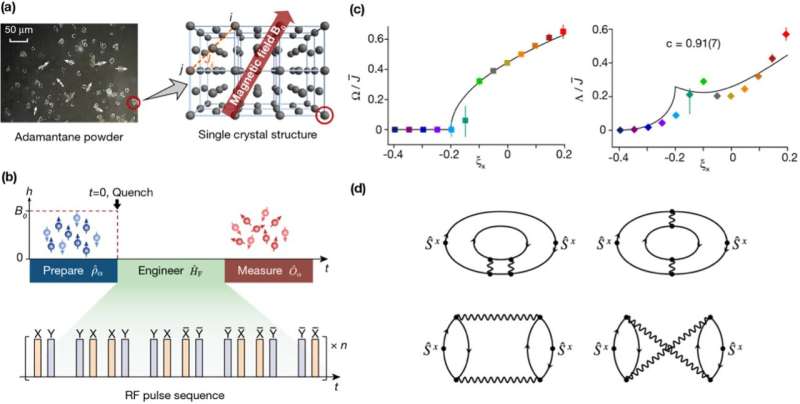Physicists discover non-equilibrium quantum dynamics in randomly interacting species.

a. A sample of adamantane powder (C10H16) and its heel shape. b. Experimental protocol and pulse sequence. c. A universal focus on spin depolarization dynamics. d. Controlling interactions behind spin depolarization dynamics. Credit: The team of Prof. Du
A new study has discovered the universe’s far-from-equilibrium forces in randomly interacting spin models, thus adding to the well-established universe of low-energy equilibrium physics. Study, recently published in Natural Physicswas the result of a collaborative effort involving a research group led by Prof. Du Jiangfeng and Prof. Peng Xinhua at the University of Science and Technology of China (USTC), together with the theoretical groups of Prof. Zhai Hui from Tsinghua University and Dr. Zhang Pengfei of Fudan University.
Unbalanced energy in many physical systems is at the center of the recent development of modern science and technology, where rich phenomena have been found in recent years, especially platforms artificial ones such as ultracold atoms, superconducting qubits, trapped ions. , NV centers, and NMR systems.
However, despite its many conditions, the simple and universal laws behind quantum non-equilibrium dynamics are still lacking. Non-equilibrium energies often include states that are more excited than the average low-energy universe.
Whether the behavior of the universe can re-emerge with unbalanced forces is an important question in the field of quantum many-body physics. The main problems are caused by the strongly related nature and complexity of many non-equilibrium physical systems, as well as the experimental challenges related to the high quantum control of these systems.
Solid nuclear systems are naturally very complex physical systems that can be precisely controlled by quantum control technology, thus enabling the implementation of many different types of physical rotation. This provides a natural and flexible experimental platform for studying the non-equilibrium dynamics of many-body quantum systems.
Using many years of experience in quantum control and quantum simulation of nuclear spin systems, the researchers developed a pulse sequence to control it precisely. 1H nuclear spins in adamantane (C10H16) flour (each grain contains about 109 to 1012 molecules), and realized randomly interacting spin modes with variable anisotropic parameters. The randomness arises from random orientations between the lattice axes in different grains and constant magnetic fields.
Then the researchers noticed something new: The spin depolarization dynamics showed a clear change from monotonic to oscillatory decay when the anisotropic parameter changed. They found that the behavior of spin depolarization dynamics can be broadly described in two phases. By comparing experimental observations with several different theoretical approaches, the researchers provided a comprehensive theoretical explanation of this non-equilibrium quantum many-body dynamics.
This research has identified a new model of the universe through the unsteady processes of many physical systems that are challenging to simulate with traditional computers. It serves as a good example of how quantum information technology can be used to discover new laws of nature.
Moreover, the methods and techniques used in the experiments provide new insights into other physical processes, such as ultracold atoms or molecules and NV ensembles. The research greatly improves the understanding of such complex systems, which can arouse widespread interest in various fields of physics.
Additional information:
Yuchen Li et al, Emergent universal quench dynamics in randomly interacting models, Natural Physics (2024). DOI: 10.1038/s41567-024-02664-0
Provided by the University of Science and Technology of China
Excerpt: Physicists discover universe’s non-equilibrium quantum dynamics in randomly interacting species (2024, October 21) retrieved on October 21, 2024 from https://phys.org/news/2024- 10-physicists-uncover-universal-equilibrium-quantum.html
This document is subject to copyright. Except for any legitimate activity for the purpose of private study or research, no part may be reproduced without written permission. Content is provided for informational purposes only.
#Physicists #discover #nonequilibrium #quantum #dynamics #randomly #interacting #species